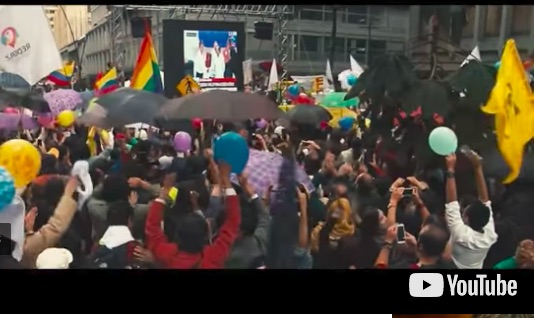EDUCATION FOR PEACE .
An article By Camila Pinzón Mendoza for Huffington Post (translated by CPNN and reprinted according to the principles of “fair use”)
Colombian artists, filmmakers, musicians, playwrights and writers have a new challenge: to create peace instead of violence. At least if the agreements between the government and the guerrillas are complied with and respected. This is an interval of time without precedient for the Colombians for which they are not only witnesses but also creators. Two centuries of violence have defined their ways of feeling, thinking, living and inspired some of their best works of art, but today is a new time, the time of post-agreement .

Scene from the official trailer at El Fin de la Guerra
Living in a country without war brings to Colombians new ways of thinking, of narrating and of living. It’s a paradigm shift since the signing of the peace agreement with the FARC, on November 24, 2016, a transit scenario. This will be explored and reflected in the Neiva Cinexcusa Film Festival between the 23rd and 27th of October. It is the most important cinematographic and cultural meeting of the department of Huila and southern Colombia, a multidisciplinary event that involves literature, music, journalism and social sciences.
“We came from an overdose of film about drug trafficking and characters built in molds and clichés,” says Luis Eduardo Manrique Rivas, director of Cinexcusa. “Maybe,” he adds, “this is the time to tell stories with more real and current characters in more intimate environments that generate identification.” In this direction, the film Pariente, which will premiere at the Festival, will represent Colombia at the Oscars of 2018. The film talks about the enemies of peace. It tells the story of Willington’s love for Mariana while the rumor of a thief in the streets and a series of violent deaths bring back the memories of fear through “rural characters who are complex, contradictory and in dispute about the lack of love and of course, violence.”
“The territory of literature exists between history and myth,” reflects Daniel Ferreira (Colombia, 1981), a guest writer at the Festival. For the writer, “the torn opening of reality allows the past to become central, ordering the past and its contradictions with another sense in a distanced way that provides clairvoyance for the future”. Ferreira is the author of the novel, Viaje al interior de un gota de sangre (Alfaguara, 2017), recently published, in which he reconstructs a massacre through the voices of the victims and for whom “there are no collective, only individual truths”.
(continued in right column)
(Click here for the original Spanish version of this article.)
Film festivals that promote a culture of peace, Do you know of others?
What is happening in Colombia, Is peace possible?
(continued from left column)
For twelve years now, Cinexcusa has addressed through the arts, the social and political problems of Colombia and the world, such as mistreatment of women, Nazism and the armed conflict of the country. Through Cinexcusa have passed authors like the Colombian Alfredo Molano, who has dedicated his life to narrate the history of violence in Colombia in books such as “Los años del tropel: relatos de la violencia,” “Trochas y fusiles,” and his most recent, “A lomo de mula.” Last year, the Argentinean Andrés Neuman, was invited and he brought the individual and collective experiences that he explores in”Una vez Argentina”. Two years ago the guest was the Argentine chronicler Josefina Licitra, who has narrated the memory of the devastated of the tragedy of Epecué in his book, “El agua mala, un episodio similar al ocurrido en Armero”. Other participating authors have included Manuel Rivas, Lucrecia Martel and Leila Guerriero.
During these five days there will be more than 30 activities, with 28 guests and 22 films, including feature films and short films, in 12 public settings in Neiva. Neiva, a city in the south of the country on the banks of the Magdalena River, has been an unavoidable place of passage, a strategic enclave for the support of the armies: a place of war. Now it is celebrated as an encounter of art, culture, peace.
The central theme of the projections of this 12th edition is the post-agreement. Thirteen films on this theme make up the bulk of the program, which also includes participation by the directors themselves or experts who open the debate, such as the director of Pariente, Iván Gaona, the well-known actor Álvaro Rodríguez and the film critic Augusto Bernal. With the purpose of providing a panorama of the national filmography, there is also the section of “Colombian Cinema”, a space to talk with the creators about their creation processes and experiences during the shooting. There is also a sample of short films, which has become a national contest, to disseminate and stimulate audiovisual projects, and a sample of films that are screened in several schools in the city, called “Cinema on the board”, which seeks to bring the cinema to the classrooms.
You are invited to look at some of the films that will be screened at Cinexcusa, a light on the contexts of war and post-conflict. Click here and scroll down for film trailers.